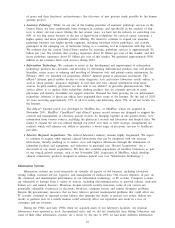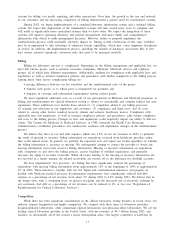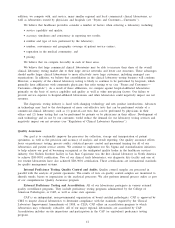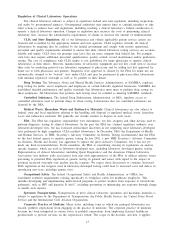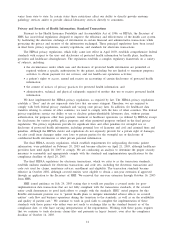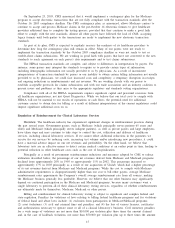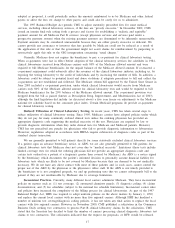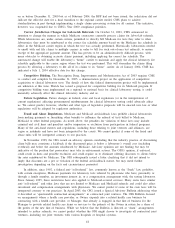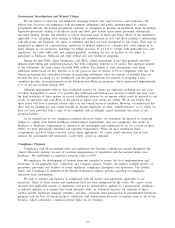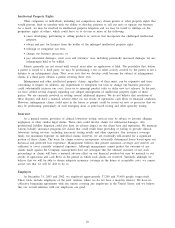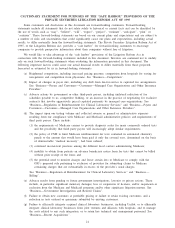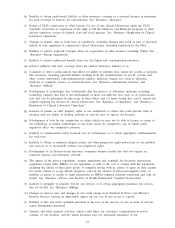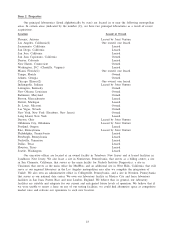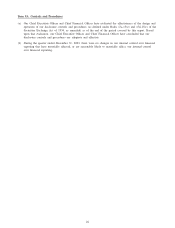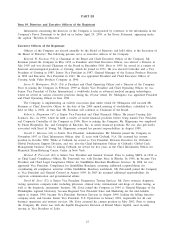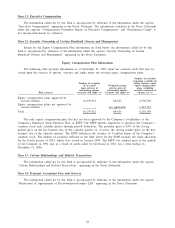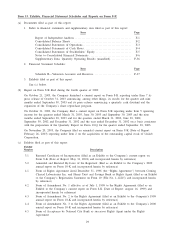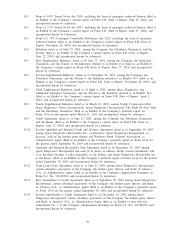Quest Diagnostics 2003 Annual Report Download - page 37
Download and view the complete annual report
Please find page 37 of the 2003 Quest Diagnostics annual report below. You can navigate through the pages in the report by either clicking on the pages listed below, or by using the keyword search tool below to find specific information within the annual report.Intellectual Property Rights
Other companies or individuals, including our competitors, may obtain patents or other property rights that
would prevent, limit or interfere with our ability to develop, perform or sell our tests or operate our business.
As a result, we may be involved in intellectual property litigation and we may be found to infringe on the
proprietary rights of others, which could force us to do one or more of the following:
•cease developing, performing or selling products or services that incorporate the challenged intellectual
property;
•obtain and pay for licenses from the holder of the infringed intellectual property right;
•redesign or reengineer our tests;
•change our business processes; or
•pay substantial damages, court costs and attorneys’ fees, including potentially increased damages for any
infringement held to be willful.
Patents generally are not issued until several years after an application is filed. The possibility that, before
a patent is issued to a third party, we may be performing a test or other activity covered by the patent is not a
defense to an infringement claim. Thus, even tests that we develop could become the subject of infringement
claims if a third party obtains a patent covering those tests.
Infringement and other intellectual property claims, regardless of their merit, can be expensive and time-
consuming to litigate. In addition, any requirement to reengineer our tests or change our business processes
could substantially increase our costs, force us to interrupt product sales or delay new test releases. In the past,
we have settled several disputes regarding our alleged infringement of intellectual property rights of third
parties. We are currently involved in settling several additional disputes. We do not believe that resolution of
these disputes will have a material adverse effect on our results of operations, cash flows or financial condition.
However, infringement claims could arise in the future as patents could be issued on tests or processes that we
may be performing, particularly in such emerging areas as gene-based testing and other specialty testing.
Insurance
As a general matter, providers of clinical laboratory testing services may be subject to lawsuits alleging
negligence or other similar legal claims. These suits could involve claims for substantial damages. Any
professional liability litigation could also have an adverse impact on our client base and reputation. We maintain
various liability insurance programs for claims that could result from providing or failing to provide clinical
laboratory testing services, including inaccurate testing results and other exposures. Our insurance coverage
limits our maximum exposure on individual claims; however, we are essentially self-insured for a significant
portion of these claims. The basis for claims reserves incorporates actuarially determined losses based upon our
historical and projected loss experience. Management believes that present insurance coverage and reserves are
sufficient to cover currently estimated exposures. Although management cannot predict the outcome of any
claims made against the Company, management does not anticipate that the ultimate outcome of any such
proceedings or claims will have a material adverse effect on our financial position but may be material to our
results of operations and cash flows in the period in which such claims are resolved. Similarly, although we
believe that we will be able to obtain adequate insurance coverage in the future at acceptable costs, we cannot
assure you that we will be able to do so.
Employees
At December 31, 2003 and 2002, we employed approximately 37,200 and 33,400 people, respectively.
These totals exclude employees of the joint ventures where we do not have a majority interest. We have no
collective bargaining agreements with any unions covering any employees in the United States, and we believe
that our overall relations with our employees are good.
20


